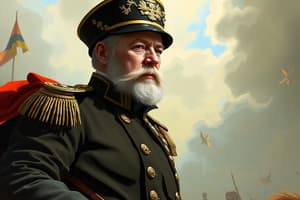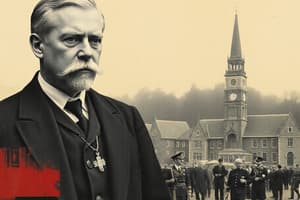Podcast
Questions and Answers
What was the main process involved in the unification of Germany?
What was the main process involved in the unification of Germany?
- Religious unification and social reforms
- Military conquest and diplomacy (correct)
- Economic cooperation and cultural exchange
- Colonial expansion and trade agreements
Who played a significant role in the unification of Germany?
Who played a significant role in the unification of Germany?
- Napoleon Bonaparte
- Queen Victoria
- Otto von Bismarck (correct)
- Winston Churchill
What was the impact of the unification of Germany?
What was the impact of the unification of Germany?
- It led to the emergence of a powerful European nation (correct)
- It resulted in the division of Germany into smaller states
- It caused a decline in Germany's influence in the region
- It had no significant impact on European politics
Flashcards are hidden until you start studying
Study Notes
Unification of Germany
- The main process involved in the unification of Germany was the efforts of Otto von Bismarck, the Prime Minister of Prussia, who used diplomacy and warfare to unite the 39 independent German states.
Key Players
- Otto von Bismarck played a significant role in the unification of Germany, using his political and military tactics to bring the states together.
Impact of Unification
- The unification of Germany led to the creation of a powerful and centralized state, which became a major player in European politics.
- The unification also led to the industrialization and modernization of Germany, which helped to increase its economic and military strength.
Studying That Suits You
Use AI to generate personalized quizzes and flashcards to suit your learning preferences.




